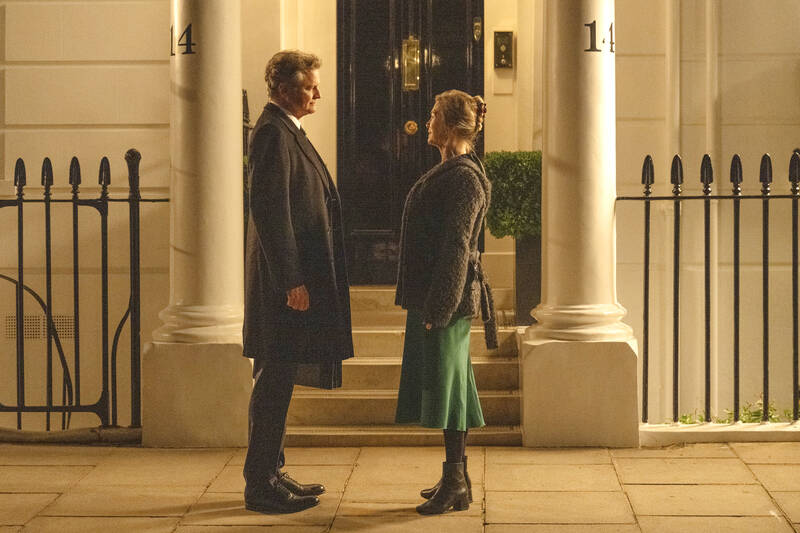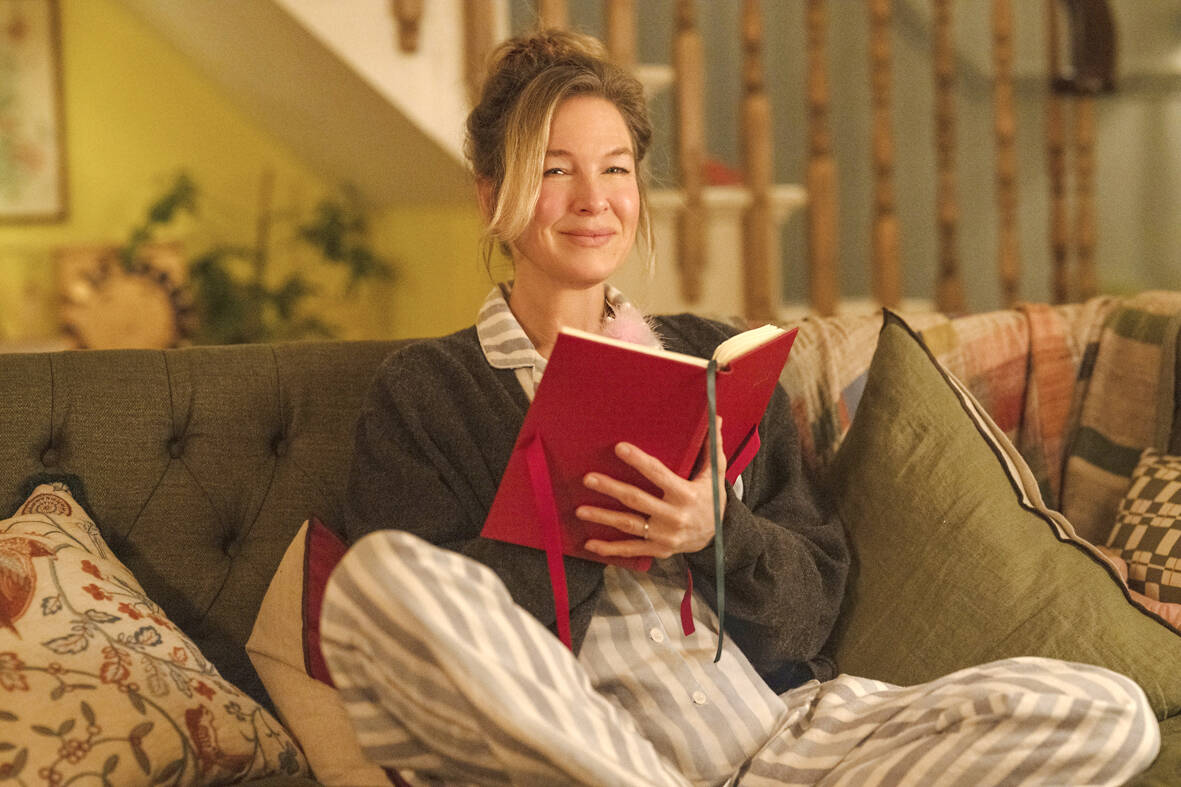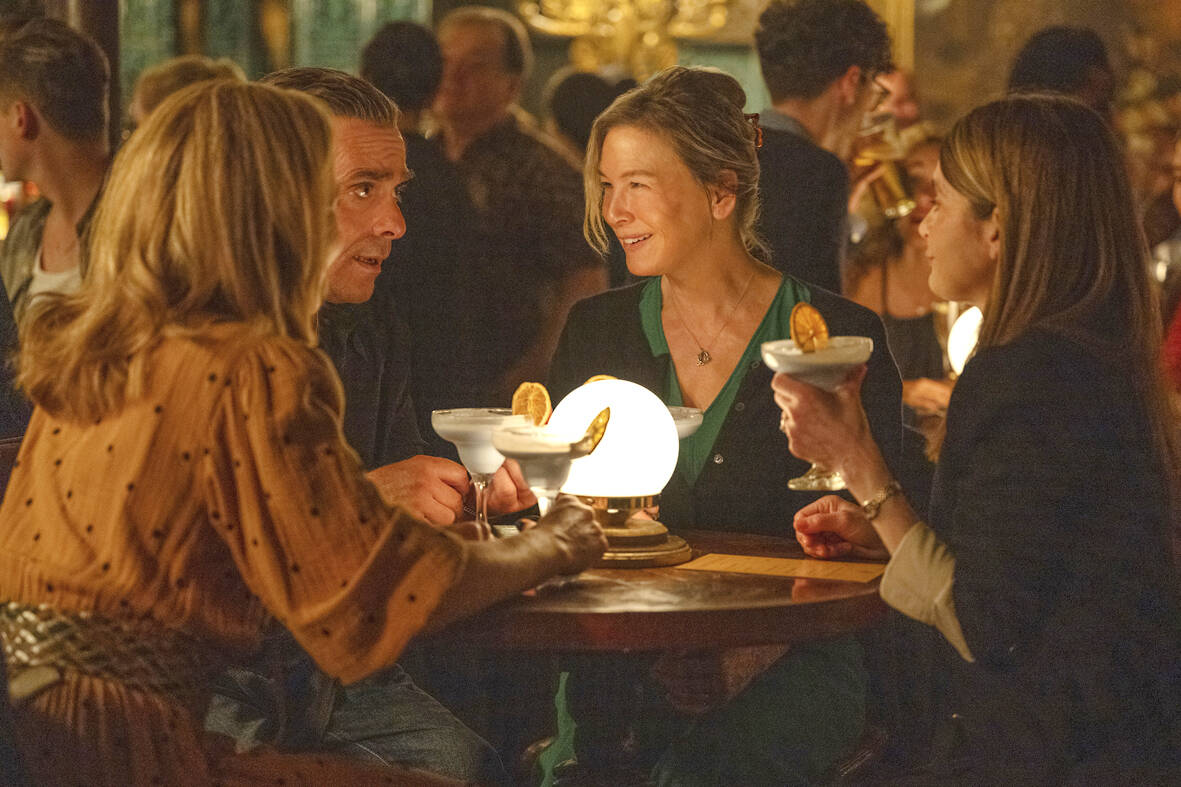It is a truth universally acknowledged, as Bridget Jones herself might write in her diary, that at the end of any Bridget Jones movie, our heroine has triumphed over all doubts and obstacles and is finally happy.
With a man. Well, so far, with one particular man: Mark Darcy, the stuffy-yet-dashing man of her dreams.
This, dear viewer, is not a spoiler for the new fourth movie, Bridget Jones: Mad About the Boy, which lands in Taiwan’s theaters today. In fact, if you’ve seen the trailer, you’ll know that Bridget (Renee Zellweger, still pretty delightful), who finally married Mark at the end of the third film, is now a widow.

Photo: AP
We’re not supposed to divulge exactly what happens next. But remember, folks, this is a classic romantic comedy franchise. Rom-coms can be sad and deep, but they still need to be romantic.
What makes Bridget Jones: Mad About the Boy especially enjoyable, then — and the best since the 2001 original — is not that Bridget finds a way yet again to triumph over doubts and obstacles. It’s that she still makes us care so darned much.
How does she do it after all these years? All I know is, I was rooting harder for her at the end of this film than I was with the others, even the original where she’s kissing Mark in the snowy street in underwear and sneakers.

Photo: AP
There are various possible explanations. One is Zellweger herself, who has brought her character gracefully into her 50s, retaining Bridget’s goofiness and deep-set optimism while reflecting hard-won life experience.
And there are subtle changes to the equation. The relationships in this latest film are more interesting — old ones and new.
Bridget’s relationship with herself is more interesting, too — and healthier. Sure, she can swig a full bottle of Chardonnay on a bad night. But the smoking is gone, and so, thank heavens, is the ridiculous weight obsession — a phenomenon that hit its nadir in the icky final line of the second film, with Bridget saying yes, you can find happiness, even if you “have a bottom the size of two bowling balls.”

Photo: AP
Nothing like that in this latest installment, directed by Michael Morris based on Helen Fielding’s novel (Fielding also co-wrote the script), which begins four years into Bridget’s widowhood. She’s living in a lovingly cluttered home in Hampstead with her kids, Billy and Mabel.
Bridget is getting dressed for a rare night at a dinner party, awaiting the sitter. That sitter is ... Daniel Cleaver himself, back for the fourth film after missing the third, which contained his funeral. (He wasn’t dead!) Hugh Grant is less adorable than in the beginning, more grizzled, still slightly creepy but more vulnerable — and a devoted friend.
At the party, all the couples want to know how Bridget is moving on with her life. She escapes, and at a bar later with her stalwart friend group (the gang from the previous movies), says she’s done with romance.
Of course, that will prove untrue. Bridget will meet her new love interest in the most Bridget Jones of ways: stuck awkwardly on a tree in the park, trying to rescue her children, also stuck.
To the rescue comes a dreamy park ranger (Leo Woodall), who also happens to see on Bridget’s phone that her friends have set up a Tinder account: “Tragic Widow Seeks Sexual Awakening.”
And thus, Bridget’s new love interest is 29-year-old Roxster McDuff — a ridiculous name, rivaling how ridiculously sexy he is. The two embark on a steamy courtship.
At the same time, Bridget has returned to work as a TV producer. Her colleagues salivate at the sight of Roxster, especially when he shows up to a party, rips off his shirt and dives into a pool to rescue a dog.
“Now THAT’S a rebrand,” Bridget’s friend says approvingly of her new life. But can their relationship triumph over the considerable age gap? It’s a subject — older woman, younger man — that’s a hot topic in current movies.
Also raised here is the question of how one moves on from deep grief to live fully again – a goal that Bridget’s late father had urged upon her (Jim Broadbent reappears briefly, as does Gemma Jones as Bridget’s mother. Colin Firth appears in a few dreamy moments. )
And there are plenty of other new issues for Bridget to navigate, too, such as how hard it is to keep up with other parents at school. For example: When Bridget is asked, by her son’s handsome and interesting yet seemingly guarded science teacher Mr. Wallaker (Chiwetel Ejiofor), to speak to the class about her career, he tells her the previous parent to come in was a Nobel winner in nuclear physics.
No worries. The lessons of this last — or so they say — Bridget Jones chapter speak to how one adjusts expectations and finds the right way to live in the world.
And on that note, as old photos from 25 years of Bridget’s life fly by during closing credits, it’s hard not to feel like she’s family — and to be more than a little proud of how she found her way.

In the March 9 edition of the Taipei Times a piece by Ninon Godefroy ran with the headine “The quiet, gentle rhythm of Taiwan.” It started with the line “Taiwan is a small, humble place. There is no Eiffel Tower, no pyramids — no singular attraction that draws the world’s attention.” I laughed out loud at that. This was out of no disrespect for the author or the piece, which made some interesting analogies and good points about how both Din Tai Fung’s and Taiwan Semiconductor Manufacturing Co’s (TSMC, 台積電) meticulous attention to detail and quality are not quite up to

April 21 to April 27 Hsieh Er’s (謝娥) political fortunes were rising fast after she got out of jail and joined the Chinese Nationalist Party (KMT) in December 1945. Not only did she hold key positions in various committees, she was elected the only woman on the Taipei City Council and headed to Nanjing in 1946 as the sole Taiwanese female representative to the National Constituent Assembly. With the support of first lady Soong May-ling (宋美齡), she started the Taipei Women’s Association and Taiwan Provincial Women’s Association, where she

It is one of the more remarkable facts of Taiwan history that it was never occupied or claimed by any of the numerous kingdoms of southern China — Han or otherwise — that lay just across the water from it. None of their brilliant ministers ever discovered that Taiwan was a “core interest” of the state whose annexation was “inevitable.” As Paul Kua notes in an excellent monograph laying out how the Portuguese gave Taiwan the name “Formosa,” the first Europeans to express an interest in occupying Taiwan were the Spanish. Tonio Andrade in his seminal work, How Taiwan Became Chinese,

Mongolian influencer Anudari Daarya looks effortlessly glamorous and carefree in her social media posts — but the classically trained pianist’s road to acceptance as a transgender artist has been anything but easy. She is one of a growing number of Mongolian LGBTQ youth challenging stereotypes and fighting for acceptance through media representation in the socially conservative country. LGBTQ Mongolians often hide their identities from their employers and colleagues for fear of discrimination, with a survey by the non-profit LGBT Centre Mongolia showing that only 20 percent of people felt comfortable coming out at work. Daarya, 25, said she has faced discrimination since she